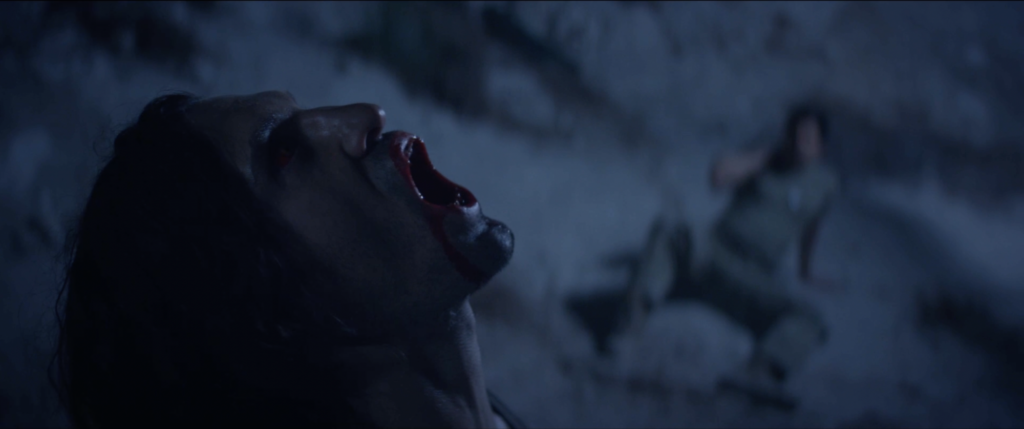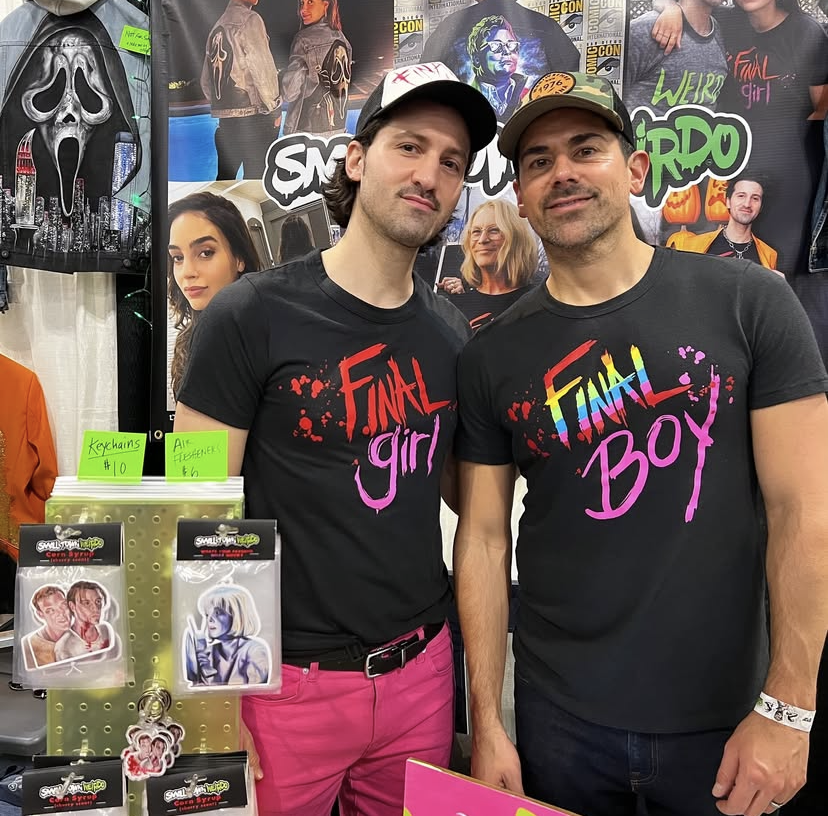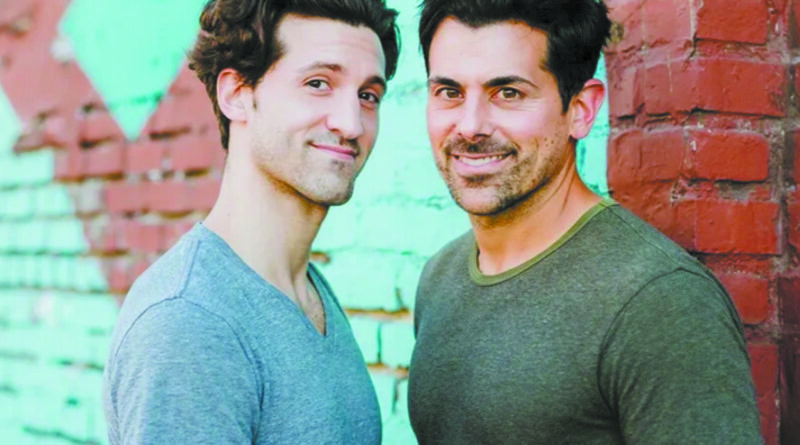OIFF Let It Kill You: Adam Bucci & Adam Huss
Both Adam Huss and Adam Bucci are actors first. They met in Los Angeles performing in a world premiere musical called Justin Love at The Celebration Theater in 2012! They both moved to LA from the East Coast (Huss is from Long Island, NY and Bucci is from Riveredge, NJ) at different times to pursue careers doing what they love, acting in film and television. After meeting in the play and falling in love, Huss booked the series regular role of Joshua Kantos in Power on Starz. Huss and Bucci moved to Brooklyn, NY along with their super pup Sawyer for a few years before moving back to Los Angeles when Huss’ character arc was complete. Bucci went on to book the recurring role of Trevor on the groundbreaking LGBTQ+ Netflix series, Eastsiders. Shortly thereafter, Huss landed the role of Nikolas Cassadine, Laura Spencer’s troubled son, on the the long running ABC soap opera, General Hospital.
Both Bucci and Huss worked consistently in the independent and TV film world and yearned to create their own passion projects with stories that might help “change the molecule in a room” upon viewing. Together, they created Let It Kill You, an elevated LGBTQ+ werewolf film, before David Cornue took the project on fully as writer, producer, and director of the short film. With David’s mentoring, Huss came into his own as a writer. He finished three more features and a few short films. Huss and Bucci started their production company, Molecule Productions. They filmed four short films under that banner and starred in them all together. The short films played across the U.S. in prestigious film festivals. Two of their horror short films won awards at the film festivals including being named the winner of an M. Night Shyamalan festival, where Huss and Bucci got to meet with Mr. Shyamalan one on one ( a true career highlight!). Their next endeavor is producing their first feature film, Original Tru, a high school LGBTQ+ coming-of-age romantic comedy written by Huss and starring Bradley Bredeweg. Hopefully they will find a way to make a feature film version of Let It Kill You.

How did the idea for the film come about?
We wrote this film almost ten years after Adam Bucci and I met. He came out to his family for the first time and was met with a horrific response, being cut off from them for almost a year. Even though I had support from family and friends, after landing a dream role on a network show, I was instructed by the public relations team to hide my social media accounts with any pictures of Adam and I as a couple (this was back in 2013). Being asked to hide my social media accounts chipped away at my confidence and all the work that I had done on myself to be hired for a recurring role on a show. Hiding my identity definitely had an affect on me as a human and an actor, and I was written off the show after three years. Then, even the support I had from my own family was tested when I told my parents that Bucci and I wanted to have a traditional wedding. We were met with responses along the lines of “why would you want to do that in front of everyone” and “why can’t the wedding just be a quiet thing.” We had to confront our own shame before confronting theirs, but thankfully both sides of our families came around to not only help us pay for a traditional wedding, but also attend and tell us it changed their idea of love that day. They could not be more supportive of us than they are now.
Those experiences inspired us to harness all that hypocrisy and exclusion by writing Let It Kill You, an elevated horror film using the werewolf lore as a metaphor for sexual transformation, identity, and the internal struggle that comes along with that. It is a story that we felt could help other people going through similar battles, but told through the horror lens to reach a wider audience. It is similar to what Get Out and other elevated horror movies have executed so well.

I watched the trailer and it is a very intense clip. There is also a homoerotic aspect that horror films either shy away from or make the villain of the story. Would you tell us the reasons why the underlying homoerotic story line is important for the overall plot.
The question answers itself, in a way. To elaborate, we are huge David Lynch fans and what he does is not the norm. In fact, everything he creates is so different and unique. He is a true weirdo and he embraces that unabashedly. By telling these types of stories in genre films, LGBTQ+ themes are not hitting you over the head but are just part of the story telling. Telling LGBTQ+ stories helps break down these barriers and normalize relationships that many still see as being weird or blatantly wrong or even immoral. And by using a monster vs. man or man vs. himself story devices, we can humanize the experience for viewers.
The feature version of Let It Kill You explores this theme even further. Look at what the current administration is doing: rolling back LGBTQ+ protections on day one, threatening to legalize only binary her/him pronouns, etc. Why are these changes a concern when the world is burning around us? We need to reach these people’s hearts and minds in the only way we know how – through our art. So perhaps with these LGBTQ+ themes being included in projects like Let It Kill You, we can reach people that may take pause and consider love and human connection instead of othering people and acting out of hate.

Would you talk about the importance of Film Festivals like OIFF having LGBTQ+ theme films?
So many distributors and big studios are still afraid of LGBTQ+ movies. Sure, they will fill a quota by having a character or two that may be part of our community but you are still only seeing brave and bold LGBTQ+ storytelling on an indie scale. Festivals are a way to get people to see these projects and hopefully have further discussions. Making a great short film serves as a proof of concept for a feature film that you believe is so important for people to see. With independent film, you can tell brave, out of the box stories that take bold risks like having the leads in a creature horror film be two queer men. These projects and artists and filmmakers do not get seen without film festivals creating the space for them.
Why is it important for audiences to support independent films?
Just as important as it is for film festivals to show these movies, it is important for the audience to see them. As audience members ourselves, we seek out films that tell our stories when we attend film festivals or search for them on streaming services at home. Audiences want to see these kinds of films and the larger the audience that shows up, the more people pay attention to the call for quality LGBTQ+ projects.

How was it working with your life partner on screen for this project and previous collaborations?
I will say, we really work well together. We were not sure at first because we spend so much time together creating these pieces in our small living space. Whether we are writing together or just in the same room while doing creative endeavors aside from our acting, we are around each other a lot.
Adam Bucci is also an artist who paints portraits on denim for a clothing company that we started called Small Town Weirdo. It is a horror company with a pop culture/horror slant and our clothes have been worn by Jamie Lee Curtis, Jack Quaid, Melissa Barrera, Harvey Guillen, Karen Gillen, and Matt Bomer to name a few. Our clothes have been featured in marketing campaigns by Lionsgate Films, Blumhouse Productions, and Universal Studios for the Halloween, The Strangers and Violent Night film franchises.
Working together is wonderful. But we were not sure if it would be overkill when we began working together on set,. We love it though. As actors, we work really well off of each other. I know they sometimes say married couples might not have the best chemistry on screen but I feel like our chemistry translates. We do not have egos about our work. We both want to serve the story so we get lost in that and it becomes about the work, period. Plus, we are really passionate about this particular story. So whenever we get a chance to actually tell it and be on set filming it (we filmed smaller proof of concepts regarding this project), it feels like a dream. Even if we have not filmed the feature yet, working together in other ways fulfills some part of that and makes the feature film feel attainable.
As producers, we both have our strong suits. I know that if I am busy putting out one fire on set, he has my back and is covering whatever else needs to be done. And vice versa. The confidence knowing that is priceless. When we are acting in the piece that we are also producing, having a dependable partner helps us focus while we are in front of the camera because we know everything behind the scenes is being handled.

What new projects are you working on?
Our current project is Original Tru, a coming of age LGBTQ+ high school movie in the vein of Pretty In Pink and Scott Pilgrim vs. the World, written by me, Adam Huss. I always loved John Hughes movies growing up, but in retrospect, they never had any LGBTQ+ characters. Despite having a lot of stereotypes, I still love the heart and themes of those films. With Original Tru, I wanted to capture that nostalgic feel of falling in love for the first time and hanging with your best friends in high school, but with a modern take. Our main character Truman is an underground comic book creator whose online comic series Truth Man lampoons the popular clique at his high school. When a certain issue goes viral and uncovers a scandal among the popular students, the status quo of the school is turned on its head and the outcasts rise to the top. But with great power comes great responsibility and, as Truman starts to get everything he wants including popular athlete Bastian, he risks losing everything including those closest to him. The movie is live action with animated elements to reflect what’s going on inside our protagonist’s head (similar to the Scott Pilgrim vibe). It’s a lot of fun and filled with a lot of heart. Our production company Molecule Productions is producing the film with Bradley Bredeweg (The Fosters and Good Trouble) and We’re There Films.

